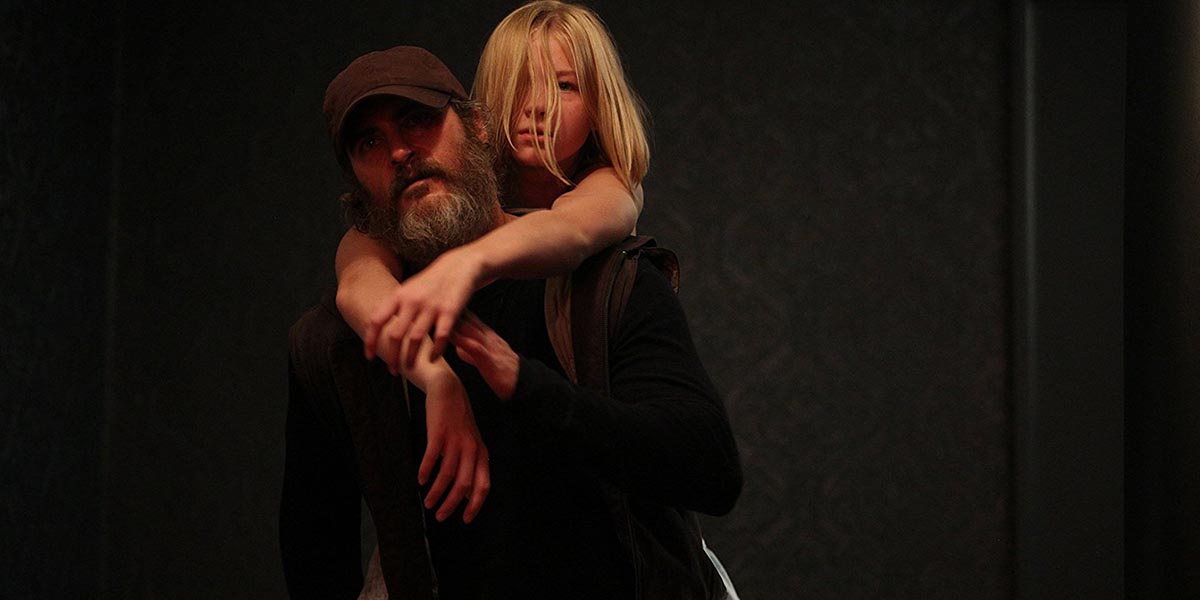The new film by Lynne Ramsay “You were never really here” is a tense & intense audio-visual poetry condescend in taut ninety minutes.
You were never really here is an art-house master-class in aesthetical and elliptical storytelling, where the sound seamlessly blends with the visuals to form a compelling narrative, reminiscent of Nicolas Winding Refn‘s Drive.
The parallel between “You were never really here” and “Drive” carries an uncanny similarity to suggest the heavy influence it has. It shares a reclusive lead protagonist emerging out of the dysfunctional society, the classical botched job that ends in a brutal face-off, combining the immersive audio-visuals to create a layered intersecting psychological & cognitive crime drama.
Lynne Ramsay has mastered the art of setting the tone of her films in the prologue. And it is quite deceiving here. With the help of sharp editing and stunning choreography, the opening montage scene is fragmented and perplexing. It draws us into a hotel room that has witnessed a terrible event.
We see a beefed up hired gun, Joe, who lights a photograph, cleans the blood on a ball peen hammer, dismantles the pistol, collects all the evidence, avoids anyone’s attention, and takes a backdoor when the police arrive at the possible crime scene. It is misleading but suggestive that he might be responsible for some kind of violence.

You were never really here is a multi-layered story having subtexts that are difficult to grasp, though the blurb makes it look like a straightforward story. Ramsay never gives out straightforward answers, instead, she leaves the breadcrumbs of the puzzles to throw us in an ambiguous state so that as a viewer we are not only watching the film but slowly we become part of the narrative to fully comprehend it.
Ramsay shows Joe’s childhood in brief flashes early on, leaving a lot to our imagination that is later fed through subtle intense expressions. The camera stays still for a long time, Jonny Greenwood fills the silence, Thomas Townend helps to communicate through the visuals, that is how most part of the film is cleverly structured. As intense the events in the film unfold, the grip of pain and anxiety starts stifling him literally and metaphorically.
Joaquin Phoenix sinks his teeth into the character with the utmost care, that at times reminded me of Freddie Quell from The Master, except that he has swelled up and has scars on his back and arms. He suffers from post-traumatic stress that stirs up vehement anxiety behaviour often leading to suicidal thoughts. We often see him pulled by the gravity of depression to a point he finds it difficult to have healthy living a society.
The only person to keep his sanity in check and look beyond his fierce eyes & reach beneath his thick skin to twitch the heart is his decaying mother. Their relationship is grounded in shared anguish and victimhood. His scenes with the mother are absolutely delightful and humorous. It gives the emotional deft to the character and establishes that he is not a ruthless hitman. He is even kind enough to forgive and hold the hands of a henchman breathing his last breath who killed Joe’s mother at point blank.
Joe is called upon to rescue a Senator’s underage daughter, Nina (Ekaterina Samsonov), from a sex trafficking ring. Senator confirms, ” McCleary said you were brutal.” Takes a pause and looks into his eyes to dictate, “I want you to hurt them.” What could be more horrific than dropping the audience in the middle of the action to imagine the brutality Joe leashes upon the henchmen guarding the paedophile’s wing of a Manhattan brothel, without showing the graphical violence on the screen? Multiple security cameras are employed as a vantage point to show the fractured perspective of the ongoing carnage, frequently interrupted by “Angel Baby” song in the background, as the body count gradually escalates.
It’s a simple job until, inevitably, it very much isn’t. The simple job turns into a catastrophic event. This is an obvious nod to ‘Taxi Driver‘ that gets further strengthened when it is revealed the entire violent upheaval in a Manhattan brothel run by Governor is politically motivated sexual exploitation of underage girls. He takes responsibility for Nina upon himself after the death of Senator, which invites the chaos to Joe’s home. Innocent lives are sacrificed in collateral damage, things spiral out of control for Joe. To put an end to the long misery of cat-and-mouse chase, Joe tracks down the Governor at his villa.
Going back to ‘Drive’ to draw the parallels, Driver (played by Ryan Gosling) is embroiled in a brutal and deadly chain of events just like Joe when they both agree for a job in order to protect the respective girls. They both are an hyper-violent European art-house movie.
The violence in “You were never really here” is mostly off-screen but heightening the sound of the ongoing fight simulates the gut to wrench in horror of what possibly might have happened. The repercussion of that violence on Joe’s psyche is clear enough to measure the brutality. Interesting to observe that Joe’s only weapon is ball peen hammer. It’s his psychic manifestation resulting from the childhood trauma to vent out the internalised anger by hammering corrupt souls.
Phoenix is a revelation here. He sinks his teeth into the character and gets under the skin to deliver one of the finest performances of the decade. Even a simple twitch of the body makes a difference to the whole gamut of emotions. Internalised sentiments and past traumas along with finding a righteous ground reflect in his body language. Ramsay has created a ticking bomb that would go off anytime. It’s a silent screech. “You Were Never Really Here” is a tense & intense audio-visual poetry condescend in taut 90-minutes.


